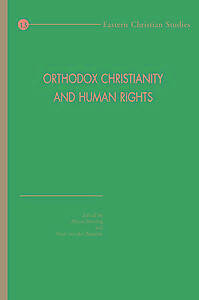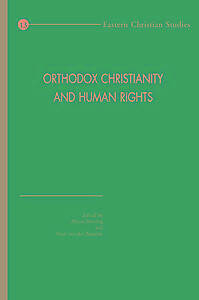
Door een staking bij bpost kan je online bestelling op dit moment iets langer onderweg zijn dan voorzien. Dringend iets nodig? Onze winkels ontvangen jou met open armen!
- Afhalen na 1 uur in een winkel met voorraad
- Gratis thuislevering in België vanaf € 30
- Ruim aanbod met 7 miljoen producten
Door een staking bij bpost kan je online bestelling op dit moment iets langer onderweg zijn dan voorzien. Dringend iets nodig? Onze winkels ontvangen jou met open armen!
- Afhalen na 1 uur in een winkel met voorraad
- Gratis thuislevering in België vanaf € 30
- Ruim aanbod met 7 miljoen producten
Zoeken
Omschrijving
Orthodox theology and the Orthodox Churches had, and continue to have an ambiguous relationship towards the concept of Human Rights: principal approval often stands alongside serious criticism. This is especially true for those Orthodox Churches which have their centre in a country of the former Soviet sphere. On the one hand, especially since the fall of Communism they enjoy religious freedom that forms a central element within the framework of Human Rights. On the other hand, the transformation process of the 1990s and the challenge of pluralism and globalization have all confronted them with aspects of freedom that could not but affect their stance towards the Human Rights concept in general. This also means, that doubts and reservations related to this concept came to the fore again, which had yet existed already decades before. These reservations focused on such issues as Church and secular society, Church and state, furthermore on the understanding of central terms such as freedom, dignity, rights - central also for an Orthodox anthropology, that needs to be reconciled with the partly differing approaches behind the Human Rights concept.The chapters of this volume try and explore as much the philosophical and theological as the social, historical and practical aspects of this complex relationship. Based either on the discussion of differing theological concepts, or on empirical and concrete case studies respectively, they clearly show the tensions and fractures that do exist. On the other hand, in this way they also hint at possibilities to overcome these tensions, to continue a dialogue that already has begun, and to avoid the numerous misunderstandings between East and West which currently tend to form a hindrance to this dialogue at various points.
Specificaties
Betrokkenen
- Auteur(s):
- Uitgeverij:
Inhoud
- Aantal bladzijden:
- 399
- Taal:
- Engels
- Reeks:
- Reeksnummer:
- nr. 13
Eigenschappen
- Productcode (EAN):
- 9789042925083
- Verschijningsdatum:
- 21/05/2012
- Uitvoering:
- Paperback
- Formaat:
- Trade paperback (VS)
- Afmetingen:
- 160 mm x 239 mm
- Gewicht:
- 680 g

Alleen bij Standaard Boekhandel
+ 112 punten op je klantenkaart van Standaard Boekhandel
Beoordelingen
We publiceren alleen reviews die voldoen aan de voorwaarden voor reviews. Bekijk onze voorwaarden voor reviews.











